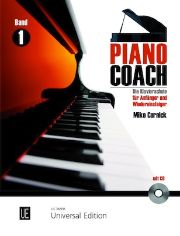Minimalist design in Basel
The music departments in Basel-Stadt and Basel-Landschaft are opposing a de facto reduction in music lessons at lower secondary level. One of their complaints is that music and visual arts would be massively devalued by being moved to the compulsory elective area, which would run counter to the new federal constitutional article on music education adopted by the electorate. This reduction was discussed at the Volkshaus in Basel on February 27.
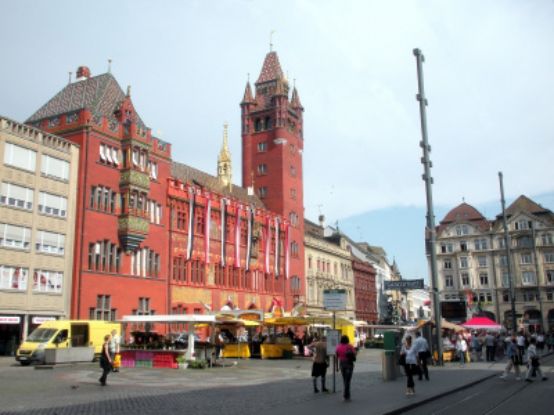
Anyone who believed that the very clear approval of the constitutional article on music education by voters last fall would have strengthened the future position of music as a subject in Basel schools has been proven wrong by the current plans of the cantons of Basel-Stadt and Basel-Landschaft as part of the implementation of HarmoS. On the contrary: music lessons are being massively reduced, particularly in Basel-Stadt, and downgraded to a (deselectable) minor subject at secondary level. In addition, the basic music courses in Basel-Stadt are to be taken away from the aegis of the Music Academy, although this model has proven its worth for over 40 years.
Basic course teachers: Responsibility now lies with the elementary school
In Basel-Stadt, the basic course teachers were previously, uniquely in Switzerland, under the direct supervision of the music academy. Stephan Schmidt, Director of the Basel Music Academy, referred to the many years of good experience with the current model and warned of a foreseeable long-term loss of quality; if the teachers also had to teach other subjects in the future, it would hardly be possible to achieve the same quality as with "only" musicians, who are also highly motivated to teach their subject. Benno Graber from the Basel-Landschaft Office for Primary Schools replied that these fears had not come true in Baselland and emphasized the advantage of integrating music teachers into the respective school culture and the contact with colleagues. In addition, postgraduate training in music could be completed if required. Schmidt put this into perspective: a shorter postgraduate course could in no way make up for a well-founded education. The panel identified a fundamental problem in teacher training itself, where music can be opted out of.
Paris scholarships for musicians
The Bern Office for Culture is offering five cultural scholarships in New York, Paris and Berlin in 2014. Musicians can apply for two six-month residencies in Paris.

Two scholarships for professional musicians from Bern will be awarded in Paris next year. The artists are invited to spend either January to June or July to December 2014 in the Canton of Bern's furnished studio at the Cité Internationale des Arts. In addition to free accommodation, the scholarship includes a monthly sum of CHF 3,000 towards living and travel expenses. The scholarship is not suitable for stays with children.
The prerequisites for admission to the adjudication are a professional performance record, legal residence and/or professional cultural activity in the Canton of Bern for at least two years. Applications must be submitted by April 30, 2013 at the latest and will be judged by the Music Commission. The documents are available on the website of the Office of Culture:
Contact: lejla.sukaj@erz.be.ch
Air - the volatile operating system of sound
Stockhausen's "Helicopter Quartet" takes us to windy heights, we let the organ of the future roar, consider a method for improving the voice through breathing and ask ourselves whether village brass bands are slowly running out of steam.


Stockhausen's "Helicopter Quartet" takes us to windy heights, we let the organ of the future roar, consider a method for improving the voice through breathing and ask ourselves whether village brass bands are slowly running out of steam.
Focus
Air from another planet
When music learned to fly ...
L'orgue risque-t-il de manquer d'air ?
Quelle place pour le roi des instruments dans la société actuelle ?
Sounds from the future
A gripping listening experience; Audio samples
" Nous avons tous une belle et grande voix ! "
La pneumaphonie met le corps entier au service de la voix.
Alle bande manca il fiato?
Istruzione musicale e socialità nel nostro mobile presente
"Chi sa respirare, sa ben cantare"
Joseph Sopko, Professor of Phoniatrics, on voice, breath and air
and furthermore
RESONANCE
"That was very short notice"
Bodo Friedrich on changes at the Basel Chamber Orchestra
Cross bed
Confused journeys of discovery in widely divergent musical worlds
Minimalist design in Basel
Report on a discussion on the implementation of the music article
Carte Blanche with Torsten Möller
CAMPUS
Questionner l'apprentissage de la musique au 21e siècle
Les 11e Journées francophones de recherche en éducation musicale (JFREM)
Eclectic
La percussion dans tous les styles
FINAL
Airy city anthem: Puzzle by Michael Kube
The Swiss Youth Choir / Chœur Suisse des Jeunes is one of ten ensembles from eight countries invited to take part in the renowned German chamber choir competition Marktoberdorf in May.
Founded in 1994 by Hansruedi Kämpfen and Pascal Meyer, the Swiss Youth Choir is an annually reconstituted ensemble with members from all parts of Switzerland and language regions. It opens the door to professional training for young talents.
The choir has been supported by the Swiss Choral Association (SCV) and the Swiss Federation Europa Cantat (SFEC) from the outset. In Marktoberdorf from May 17 to 22, 2013, it will meet choirs from Germany, Finland, France, Puerto Rico, the Philippines, Serbia and the USA.
More info: www.chorverbaende.de/de/modfestivals/internationaler-kammerchor-wettbewerb-marktoberdorf.html
Global music in 2012
A book about "World Music 2.0" surprises with a refreshing collage-like layout.
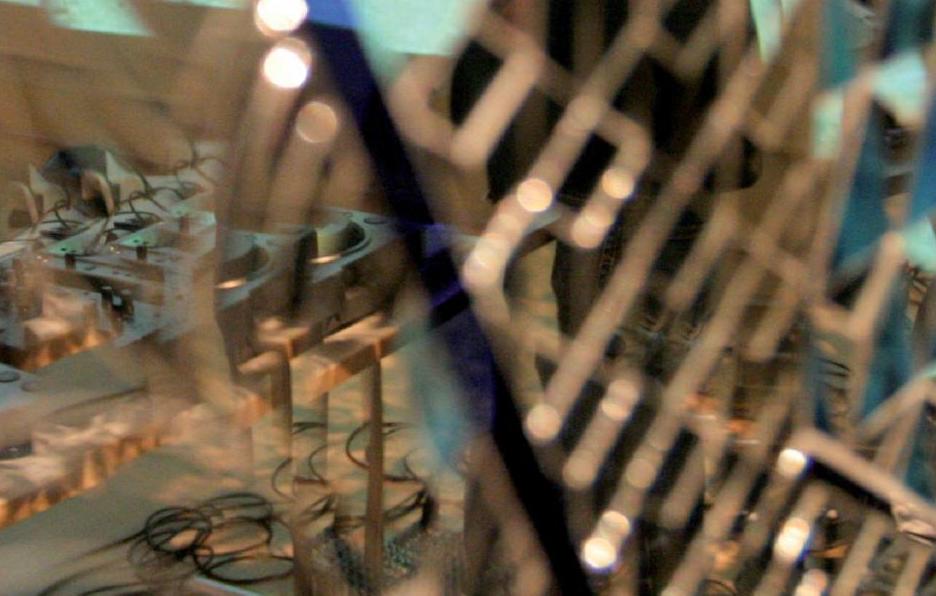
What happens when an online magazine publishes a book? Norient, the Bern-based network for local and global sounds and media culture, has taken on this task and published a book with Out of the Absurdity of Life has presented an exciting musical snapshot of our world. Editors Theresa Beyer and Thomas Burkhalter move somewhere between science, journalism and blog culture. The book is neither a pure illustrated book nor a collection of essays or a monograph: reports, scientific analyses and interviews alternate with song lyrics, CD covers, concert posters and snippets of quotes, sometimes in German, sometimes in English. The rich collage is not only graphically realized with attention to detail, it also provides the reader with new, surprising approaches to the pop-cultural music phenomena of our time. At the same time, the layout does justice to the fact that "World Music 2.0" can no longer be reduced to sounds and tones.
From Cameroonian Bikutsi Pop to the Colombian couple dance Cumbia and the Syrian New Wave Dabke to the shrill party music of Voodoohop in São Paolo: Out of the Absurdity of Life portrays facets and absurdities of a global sound present, far removed from the Eurocentric orientation of the nineties. The book explores the question of whether there is a special Alpine sound, examines the absence of a soundtrack to the Occupy movement and traces the controversial history of ethnomusicology. It discusses provocative Latin American copulation dances and provides insights into everyday global musical life. Norient also takes a critical look at its own form of publication as an online magazine and addresses the post-colonial problems of blog culture. The book never remains entirely analog and thus becomes an actual YouTube guide. What is vital for the online magazine also proves to be a valuable addition to the printed edition.
Thomas Burkhalter describes "world music 2.0" as a multi-local pop avant-garde. The oscillation of musical styles between fun and protest culture often makes it impossible to make a final judgment about the seriousness and motivations of the protagonists. One would like to read more such precise and comprehensive analyses, and one misses short summaries of the academic essays. Otherwise Out of the Absurdity of Life but a successful and heterogeneous yearbook for all musicophiles in the world. Who knows, maybe Norient will take the worthwhile leap from the online world to the printing press again in 2013?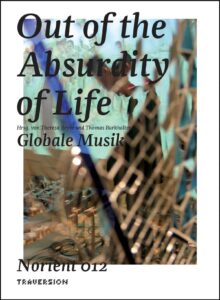
Theresa Beyer and Thomas Burkhalter (eds.), Out of the Absurdity of Life. Global Music, 328 p., CHF 36, Traversion, Deitingen 2012, ISBN 978-3-906012-03-2
Musicians with hearing aids?Completely impossible
If an orchestra were all spectacle wearers, we wouldn't think anything of it. An orchestra full of hearing aid wearers, we would probably be a little irritated. In fact, the issue of hearing loss is a difficult one for musicians.However, state-of-the-art technology also offers good solutions for them.

In their daily work, musicians are exposed to sound levels that have a damaging effect on hearing above a certain dose. And so, unfortunately, even Mozart becomes noise for the ears at some point. Much is being done to protect them from hearing damage, and there are good, sound-neutral hearing protectors, both off-the-shelf and customized. The problem, however, is that very quiet music comes out of nowhere, and in order to hear such passages and cues with 100% accuracy, even a small amount of hearing protection is too much for many people.
It's just a shame when the orchestra tutti produces volume levels of 90 or 100 dB in the next movement. What happens then is what the ear doctor calls the "c5 depression": a noise-induced hearing loss that manifests itself most strongly in the area of the five-letter c at around 4000 Hz. This is exactly where the consonants that are important for understanding speech are located. If the hearing is damaged there, the table becomes a fish and the river becomes a kiss, which can lead to embarrassing situations.
It is well known that those affected try to get by without hearing aids for years. They develop different strategies to cover up the hearing loss: one of them is to avoid difficult situations, such as the acoustically notorious cocktail party. If "normal people" find it so difficult to wear hearing aids, how much more difficult must it be for musicians to imagine performing in front of an audience with hearing aids? For many, almost unthinkable.
Modern hearing systems are very small and can be almost perfectly concealed, provided you have the right hairstyle. For those without the necessary hair, however, the devices are not so inconspicuous. They either sit behind the ears, with a small tube in the ear canal, or they sit directly in the ear. Unfortunately, you can often still see them there because the electronics are too big for the ear canal.
Recently, however, there are now truly 100% invisible hearing systems. These are placed four millimetres in front of the eardrum and remain there for up to four months, day and night. In contrast to conventional high-performance hearing systems, they are equipped with relatively little technology and functionality. They work with the so-called "Wide Dynamic Range Compression", according to which the amplification is constantly adapted to the acoustic environment.
You have to imagine that signals in a quiet environment are amplified disproportionately and that signals in a loud environment are attenuated by means of compression. For the hearing impaired, this has the dual advantage that quiet signals can be heard and that loud signals are not perceived as unpleasant. The maximum volume that the devices generate across the entire frequency range is 103 dB. This means that a brilliant "grand finale" with the devices will be somewhat less loud than in reality. This is because the deep and acoustically tight fit of the devices almost acts as hearing protection.
Not every musician or music lover will accept this limitation. For those who have no problem seeing their hearing systems, very powerful technologies are available that can process input levels of up to 106 dB. It is important that you seek professional advice and work with your hearing care professional to program the system based on your own music. This requires specialist knowledge and the appropriate infrastructure.
If you don't want your hearing aid to be visible, I can fully understand that. I wore conventional hearing aids myself for 15 years until I switched to these new, invisible ones. I understand everyone who wants a discreet solution.
Either way, if you can no longer hear the conductor's announcements or the pianissimo of your colleagues, you should do something as soon as possible.
> www.stueckelberger- hoerberatung.ch
Two Swiss pop musicians have been nominated for one of the German industry awards Echo Pop 2013. The award will be presented on March 21 in the halls of Messe Berlin.
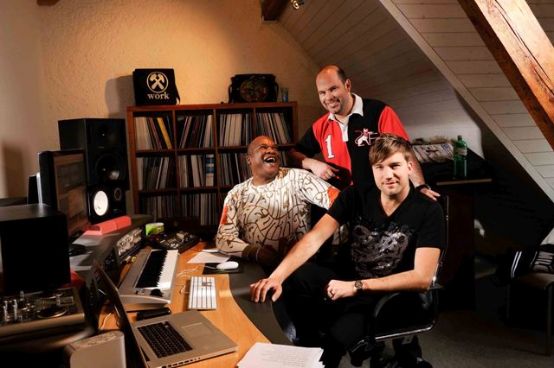
In the category Newcomer International the Bernese DSDS winner ("Deutschland sucht den Superstar") Luca Hänni is nominated. He is up against Alex Clare, Lana Del Rey, Of Monsters and Men and Emeli Sandé. At the Swiss Music Awards a few days ago, Hänni already proved himself as the Best Breaking Act National against Eliane and Müslüm.
A nomination in the category Club / Dance National / International goes to DJ Antoine, probably the most successful Swiss pop music export at the moment. His single "Ma Chérie" has sold a million copies. At this year's Swiss Music Awards, he is nominated in the category Best Hit National but came away empty-handed.
Picture: Mr. Mike, Mad Mark and DJ Antoine in the studio. Stephan Pick, wikimedia commons
Zurich student wins Warsaw competition
Chiara Enderle, cello student in the Bachelor of Music program at the Zurich University of the Arts (ZHdK) under Thomas Grossenbacher, has won first prize at the internationally renowned IX Witold Lutoslawski International Cello Competition in Warsaw.
In addition to the main prize, Chiara Enderle also won the prize for the best interpretation of the compulsory piece and the Award of the European Union of Music Competitions for Youth (EMCY).
Born in 1992, the daughter of ZHdK music lecturers Matthias and Wendy Enderle is currently studying at the Zurich University of the Arts, BA Music Art and Sports High School, with Thomas Grossenbacher.
The Witold Lutoslawski International Cello Competition has been held in Warsaw every two years since 1997. Since the beginning, it has been under the patronage of Mstislav Rostropovich. The age limit for the competition is set at 24 and, in addition to a broad repertoire ranging from baroque to contemporary music, the cello concerto by Witold Lutoslawski is required as a compulsory piece, which is performed with orchestra in the third round of the competition.
Learning companions for all ages
What does a 21st century piano school look like? Perhaps like the "Piano Coach" by Mike Cornick.

Mike Cornick knows how to meet the needs of today's students with this refreshingly innovative piano school in two volumes. It is published by Universal Edition and, according to the foreword, is aimed at "budding piano players - whether young people or adults of all ages up to retirement age". The author is keen to provide the student with a comprehensive learning guide and pulls out all the stops. This work is therefore more than just a progressive collection of lesson pieces. The clearly structured chapters each contain the aspects of notation, playing technique, theory and ear training. What I like about it is the comprehensiveness of the supporting texts and the careful structure.
The basics of piano playing (introduction to two-handed playing, independence, parallel and contrary motion, imitation, polyphony, chord playing, etc.) are laid out in a thoroughly classical manner. What goes beyond the usual content of a piano school are all the explicit instructions on the aspects mentioned above. This means that the pupil can work out a lot of information independently and, if necessary, discuss and deepen it with the teacher. The pieces, many of which were composed by Mike Cornick himself, range from classical music to folk and jazz. The enclosed CD contains the recordings of the pieces, some playalong tracks and ear training exercises. But that's not all, under universaledition.com/pianocoach1 and /pianocoach2 there is further material available for free download: additional pieces, chord charts, triad breakdowns, keys, hints for improvisation. Readers of these lines who would like to get a taste of piano coaching should also click on these pages.
Mike Cornick, Piano Coach, Die Klavierschule für Erwachsene und Wiedereinsteiger, Volume 1 UE 34991, with 1 CD, € 19.95, Universal Edition, Vienna 2010
id., Volume 2 UE 34992, with 2 CDs, € 22.95, Universal Edition, Vienna 2011
On February 25, the Aargau Board of Trustees decided which of the applications received would be funded.
At its February meeting, the Aargau Board of Trustees allocated a total of 779,100 francs for cultural events. Of this amount, 152,500 francs are program contributions for classical music events, 97,000 francs flow into the rock and pop sector as program and tour contributions.
The lists of supported projects are here is now available.
The Aargau Board of Trustees decides on the awarding of grants at two to four meetings a year, depending on the subject area. Cultural institutions based in the Canton of Aargau, Aargau event organizers and Aargau artists can also submit their applications digitally. Further information can be found on the Website of the Canton of Aargau.
Gérald Berger, Head of the Office for Culture at the Directorate for Education, Culture and Sport (EKSD) of the Canton of Fribourg, will retire at the end of September 2013.
Gérald Berger has done much to open up the canton's cultural scene, making it bigger, more diverse and more professional. This has also resulted in productions that have become known beyond the canton's borders, the canton writes. Berger's name is also associated with the founding of the Fribourg Chamber Orchestra, among other things.
In 1987, the offices of Head of Service and Secretary General of the Directorate of Education, Culture and Sport (EKSD) were separated in Fribourg. Gérald Berger became the first full-time head of the Office for Cultural Affairs of the Canton of Fribourg, which was renamed the Office for Culture in 2003.
It manages its own dossiers in the area of cultural promotion. It is also responsible for the State Archives, the Cantonal and University Library, the Conservatory, the Museum of Art and History and the Natural History Museum.
Reductions at Schaffhausen music schools prevented
The Schaffhausen legislature has rejected the cantonal government's request to cut contributions to music schools.
According to a report by Radio SRF, the Schaffhausen cantonal council has rejected a reduction in contributions to music schools of CHF 275,000 per year. In future, the shortfall would have had to be covered by the parents of the music students.
The proposal to forego this cut did not come from left-wing circles, but from FDP circles. According to SRF, Urs Hunziker, Schaffhausen city councillor and head of education, spoke of "a reduction in education that he could not support".
"youth+music": Initiative committee honored with prize
In Bern, Vladimir Ashkenazy, president of the jury, presented the 7th Johanna Dürmüller-Bol Young Classic Award, endowed with 20,000 Swiss francs, to Christine Egerszegi, member of the Council of States.
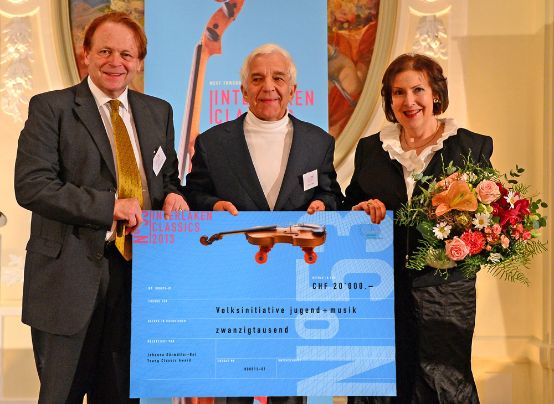
As president of the initiative committee, Christine Egerszegi and her team played a major role in ensuring that over 70 percent voted in favor of the introduction of the constitutional article in the referendum in September 2012. The clear result offers all children and young people access to music, regardless of the size of their parents' wallets, write those responsible for the prize.
The Johanna Dürmüller-Bol Young Classic Award is a joint project of the Interlaken Classics Festival and the Fondation Johanna Dürmüller-Bol. The award is presented annually to an institution that has made a special contribution to the promotion of young classical musicians.
Previous winners include the Davos Festival - young artists in concert, the Sibelius Academy Helsinki, the Bern Conservatory Music School and the Friends of the Anne-Sophie Mutter Foundation.
Benjamin Schmid honored in Germany
Benjamin Schmid, violinist and lecturer at the Bern University of the Arts (HKB), has been awarded a German Record Critics' Prize.
Schmid received the prize for his recording of a CD with music by Ermanno Wolf-Ferrari (Concerto for Violin and Orchestra in D major op. 26, orchestral music from the operas Il campiello, Le donne curiose, L'amore medico and I quattro rusteghi). The Oviedo Filarmonia is conducted by Friedrich Haider.
According to the jury, the recording is "a fervent plea for Ermanno Wolf-Ferrari's highly romantic but still little-known violin concerto; at the same time an exceptionally well-documented edition and a tribute to Guila Bustabo, the great American violinist and dedicatee of the work".
The German Record Critics' Award is an independent association of currently 145 music critics and journalists from Germany, Austria and Switzerland. Organized in 29 expert juries, the jurors examine the range of new recordings in 29 categories on a quarterly basis.
The Government Council of the Canton of Thurgau supports the "School and Culture Network" project. The aim is to strengthen cultural education in schools and thus make it easier for children and young people at all school levels to access art and culture.
A coordination and information office is given the task of setting up an online database that lists all cultural education offers in Thurgau and its catchment area. The service is to be added to the existing cultural agenda thurgaukultur.ch and networked with the planned database of other eastern Swiss cantons.
A second task of the new position is to establish a network of contact persons at the schools who are particularly concerned with cultural education issues.
A project group headed by René Munz, Head of the Cultural Office, will be set up for the duration of the three-year development phase of the new position - the Government Council has approved CHF 100,000 per year from the lottery fund for this purpose. Adrian Bleisch, a trained primary school teacher and museum educator from Egnach, will be appointed to manage the project on a contract basis.






